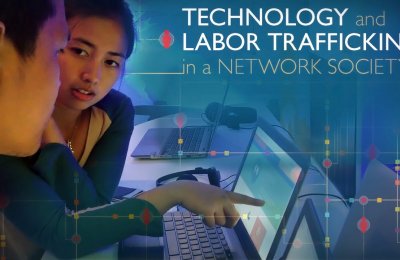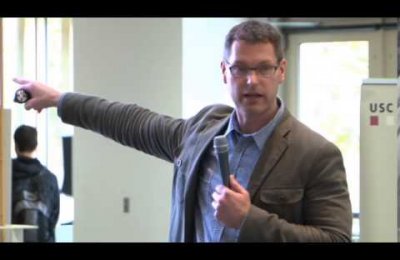By Greg Asciutto
Student Writer
The USC Center on Public Diplomacy at the Annenberg School hosted Michael B. Oren, Israel’s ambassador to the United States, for a discussion about U.S.-Israeli relations and Israel’s ongoing conflicts with Iran and the Palestinian people.
Before a crowd of 200 students, faculty and guests, Oren recounted a history of the United States’ relationship with the Jewish people that is defined by four key elements: spiritual ties, shared democratic values, a strategic military alliance and commercial connections. (View photos of the event.)
Oren said that the religious bond between the allies dates to the 17th century, when the first American settlers adopted the narrative of the Jewish people as a framework for the formation of the United States. He added that shared spiritual values continue to propel bilateral relations.
“People still read the Bible, still read their biblical promises, conclude that God keeps his promises and that becomes a crucial component in the U.S.-Israel relations: the strong, spiritual tie between the idea of America and the idea of a recreated Jewish state,” Oren said.
Militarily, the strategic partnership between the United States and Israel, two of the only nations that “have never known a second of non-democratic rule,” is “one of the closest military alliances the United States has with any foreign country,” Oren said.
Notably, cooperation between American and Israeli forces has led to the creation and maintenance of highly advanced anti-ballistic systems, an intricate intelligence relationship and on-the-ground support of troops in Iraq and Afghanistan.
Concerning the commercial ties joining the nations, Oren spoke highly of Israel’s technological value and the close relationship between American and Israeli high-tech companies.
“The world high-tech community regards Silicon Valley here in California and Israel as a single entity,” Oren said. “They don’t distinguish between the two.”
Technological innovation has been crucial to the growing economic partnership, one that has seen “$90 billion in investment on the American side of Israel and about $60 billion of Israeli investment in the United States” within the past decade.
“The U.S.-Israel relationship; there’s nothing like it,” Oren said. “The most multi-faceted and deepest relationship. That relationship now is confronting a Middle East which is highly fluid and highly flammable. The whole region is boiling around us.”
In a question-and-answer session moderated by USC Annenberg Dean Ernest J. Wilson III, Oren touched on the Iranian nuclear situation and the growing tensions with the Palestinian people.
“We’ve seen now that the Iranian nuclear program is advancing, according to the International Atomic Energy Agency,” said Oren, who called Iran an “unparalleled national threat.”
“We are situated in Iran’s backyard and are threatened by Iranian leadership with national annihilation. We have Iranian proxy terrorist organizations — Hezbollah, Hamas and others — that have something in the order of 100,000 rockets aimed at our homes and neighborhoods and schools.”
Oren recounted President Barack Obama’s declaration that Israel has the right to defend itself against any Middle Eastern threat, but expressed the nation’s wish to avoid exercising that right.
“We want to have a resolution, therefore we support the (nuclear) sanctions, we’ve always supported the sanctions, we support escalating the sanctions,” he said.
On the subject of Palestinian land, Oren said that Israel is willing to negotiate a two-state solution.
“We recognize that there is a Palestinian people. We recognize that the Palestinian people (are) endowed with the right of self-determination. We need the Palestinians to recognize the Jewish people as a people endowed with the exact same right. That is the only way to end this conflict.”
USC's student newspaper, The Daily Trojan, also covered the event. Read the article here .
USC Center on Public Diplomacy at the Annenberg School
Photos








